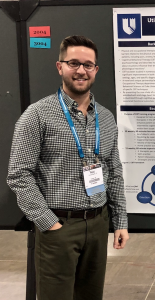Reid Medlin ’09 (’15 DPT) is relying on his training as a cardiopulmonary physical therapist during the COVID-19 pandemic; he credits the versatility of training with how those in the profession have responded to the virus.

Medlin, a Rockingham County, North Carolina native, has worked as a physical therapist at Duke University Hospital since completing the Doctor of Physical Therapy program. On a typical day, Medlin works with patients to prepare them for major operations, such as heart surgery.
“I may just be teaching someone who is waiting for a heart transplant how to get up and move so they can keep their heart functions strong,” Medlin explained. “This can result in better outcomes because they were conditioned appropriately beforehand. […] “It’s tying all the pieces together to help them understand what their body is going through so they can improve over time.”
As the COVID-19 pandemic intensifies, Medlin said the role of a physical therapist in a hospital setting could evolve in order to assist in patient care; organizations are developing practice guidelines in response to the pandemic.
“It’s not that we’re trying to blindly go in and do whatever we can,” Medlin said. “It’s important to realize that we might have a limit to where other providers need to step in and get these patients over a hump.”
Medlin explained many ways in which a physical therapist might be called upon to assist in patient care. For example, a physical therapist could teach breathing exercises, assist in airway clearance, or provide strengthening exercises.
For COVID-19 patients who might need breathing support from a ventilator, Medlin said positioning them in different ways may help with getting oxygen to the lungs.
“Our role really has the potential to ramp up before someone becomes critically ill or after they’ve successfully survived the critical medical issues that stem from COVID-19,” Medlin said. “Then, we can really get in and help improve their functional quality of life and get up and start moving again.”
Medlin, who co-teaches a cardiopulmonary course in the DPT program alongside alumnus Sean Lowers ’09, said a physical therapist also might be able to work with COVID-19 patients in order to minimize fluid collection in lungs, which might delay or avoid intubation or time in the intensive care unit.
While Medlin has not yet treated a patient with COVID-19, he said he feels a heightened sense of preparedness, particularly as the virus continues to spread across North Carolina.
“That mindset of being open and being able to be versatile and make quick changes on the fly has really helped me and helps us as a profession,” Medlin said. “A lot of us are doing things to help prepare, but I think a lot of us don’t understand how big it’s going to be.”
He credited the rigor of the DPT program with training him to think through issues to provide high-quality patient care.
“They do a really good job of training us to be well-rounded clinicians who are open minded for whatever we’re up against,” Medlin said. “We’re treating the person as a whole.”
Medlin said the interdisciplinary nature of work in physical therapy is another advantage, particularly when faced with a pandemic.
“As a PT, we have our own opinions about things, but we’re always having to communicate with doctors and nurses and other providers about what we think is happening,” Medlin said. “I’m still around those providers; I’m still able to go to work and make an impact on this horrible virus.”
U.S. News & World Report recently ranked the DPT program as #9 in the country. The DPT program is housed in the Department of Allied Health Sciences’ Division of Physical Therapy.